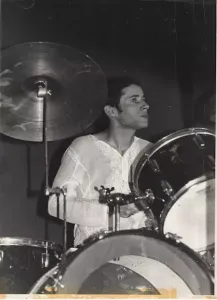
Jean-Pierre Martinez first started as a drummer in the 1980s, playing in various bands such as Les Rebelles (French chanson), Expérience (jazz-rock), and Mami Wata (African soul). He performed numerous concerts in the Paris region alongside popular bands of that era, such as Blessed Virgins.
Music plays a crucial role in his plays, not merely as decoration but as a structural element of the plot. Some songs directly inspire the theme of the plays (Les Passantes by Brassens or Je suis de celles by Bénabar). More often, songs serve as a comedic device or an ironic counterpoint to the theatrical text. This musical repertoire is also a tribute to French chanson, particularly popular songs, which serve as a medium for messages and as reflections of their time.
1. Music at the Heart of the Plot
In Music does not always soothe the Savage Beasts, a classical music concert serves as the starting point of the story. The Camembert family, striving to integrate into the high society of Moulinrouge, organizes a dinner concert. However, the pianist’s head is found floating in the swimming pool. This farce humorously subverts the aristocratic and elitist perception of classical music.
2. Artist Characters
The iconic singer Mireille Mathieu takes center stage in the madcap comedy Is there a pilot in the audience?
In The Rebels, a bittersweet comedy, the play portrays the tragicomic lives of characters once united by music in their youth but whose dreams have since faded.
In The perfect son-in-law, the main character is a musician who abandoned his fiancée to go on tour.
Other failed artists populate Jean-Pierre Martinez’s plays, whether actors (Heads or Tails) or playwrights (Running on empty, Cheaters).
3. Songs That Inspired Plays
Some plays take direct inspiration from songs:
Je suis de celles by Bénabar inspired Brigitte’s character in Back in the spotlight.
Several Bénabar songs punctuate A Hell of a Night (Le Dîner, Tu peux compter sur moi, L’effet papillon).
Les Passantes by Georges Brassens inspired Preliminaries.
- La Ballade des gens qui sont nés quelque part by Brassens is referenced in Blue Flamingos. The song humorously critiques obsession with ancestry and racism.
4. Songs That Create Atmosphere
Some songs set the mood:
Queer culture in Happy Hour: Dalida (Besame Besame, Il venait d’avoir 18 ans, J’attendrai), Aznavour (Comme ils disent).
Artists’ frustrated ambitions in Heads or Tails: Aznavour (La Bohème, J’me voyais déjà).
The free spirit of the 1960s: San Francisco by Maxime Le Forestier in The window across the courtyard.
The atmosphere of street life: Bancs publics by Georges Brassens in Stage Briefs .
Macabre poetry: Rien by Brigitte Fontaine in Stage Briefs and New Year’s Eve at the Morgue: “Une femme qui meurt reste-t-elle féminine?”
5. Songs That Define Characters
In Four Stars, Edouard sings Spider Pig (The Simpsons), while Kimberley belts out Johnny, envoie-moi au ciel… (Boris Vian).
In Happy Dogs, a dark teenager is associated with Psycho Killer (Talking Heads).
- Brigitte in Back in the spotlight sings My Heart Belongs to Daddy (Marilyn Monroe).
6. Music as a Comedic Device
Humorous evocations of places:
Locker rooms in Offside: Les Garçons dans les vestiaires (Clarika).
Belgium in The Fishbowl: Ne me quitte pas, Le Plat pays, Bruxelles (Brel).
The Camargue in Blue Flamingos: Pour moi la vie va commencer (Johnny Hallyday).
Ironic counterpoints:
Smoke on the Water (Deep Purple) in The perfect son-in-law.
L’Hymne à l’amour (Piaf) in An innocent little murder
La Marseillaise in A simple business dinner
The Ride of the Valkyries (Wagner) in Blue Flamingos and The Worst Village in England (to evoke pesticide spraying). Wagner also drowns out screams and fight noises in Neighbours’ Day, leading to the humorous exchange: “I love this passage. It’s Chopin, isn’t it? – It’s Wagner.” Later: “Don’t they say that music soothes murder? I mean, manners…”
Für Elise in Open Letters and Some Stories to die for.
Mozart’s Requiem in False Exit.
A priest, after eating space cakes, breaks into a bawdy song (Le curé de Camaret) in Just like a Christmas movie.
Parodic re-interpretations:
Si j’avais un marteau (Claude François) in Family Portrait.
Allumer le feu (Johnny Hallyday) in Some Stories to die for.
Toi, le frère que je n’ai jamais eu (Maxime Le Forestier) in Critical but Stable .
Hécatombe (Mort aux vaches, Brassens) in Christmas Eve at the Police Station.
Comme les rois mages (Sheila) in Back in the spotlight
Conclusion
Jean-Pierre Martinez’s musical universe enriches his plays. Many directors, particularly abroad, incorporate these French references while adding new ones from their own musical cultures. Notably, the Czech production of New Year’s Eve at the Morgue: featured songs by France Gall and Brigitte Fontaine, which perfectly complemented the text.
This strong connection between text and music even led two directors to adapt Friday the 13th into a musical in Madrid.
